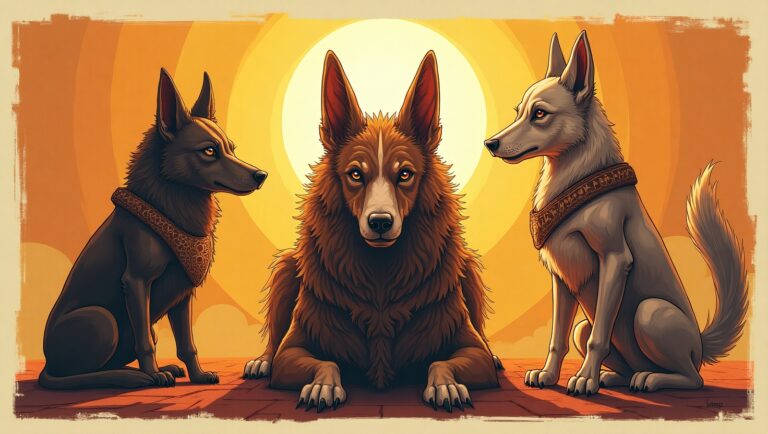Creation of Modern Kennel Clubs (AKC, FCI, UKC): A Historical and Global Perspective

Introduction: The Rise of Modern Kennel Clubs
Modern kennel clubs such as the American Kennel Club (AKC), Fédération Cynologique Internationale (FCI), and United Kennel Club (UKC) have fundamentally shaped the world of purebred dogs. These organizations serve as authorities in breed standards, genetic health, and dog show regulations, impacting millions of breeders, exhibitors, and pet owners worldwide. Understanding their formation, structure, and influence offers a deep insight into how dog breeding has evolved from informal tradition to internationally governed science.
Historical Dog Breeding Before Kennel Clubs
Before the establishment of formal kennel clubs, dog breeding was largely utilitarian and decentralized. Breeds were selected for working purposes such as herding, guarding, or hunting. Dogs were rarely bred with consistent documentation, leading to regional variations and a lack of standardized characteristics. As interest in dog ownership grew among the upper classes during the Victorian era, the need to preserve specific physical and behavioral traits increased, laying the foundation for breed classification systems.
Why Kennel Clubs Became Necessary
The rise in popularity of purebred dogs and dog shows revealed the need for structured systems to record pedigrees and evaluate dogs consistently. Breeders and show organizers realized that without unified breed standards, dog shows lacked credibility and fairness. Furthermore, there was growing concern about genetic integrity, inbreeding, and the preservation of traditional working traits. This demand for standardization catalyzed the creation of national and international kennel clubs.
The Kennel Club (UK): The World’s First Kennel Club
Founded in 1873, The Kennel Club (UK) was the first organization to provide a centralized registry for purebred dogs. Located in London, it was created by a group of sportsmen and enthusiasts who wanted to bring order to the rapidly growing world of dog shows.
Key contributions include:
- The first published Stud Book containing pedigrees
- Establishment of breed-specific conformation standards
- Oversight of organized dog shows, including the famed Crufts
Its influence became a blueprint for kennel clubs globally.
also read this Modern Canine History (19th Century–Present)
The American Kennel Club (AKC): Standardizing Breeding in the U.S.
The American Kennel Club (AKC) was established in 1884 in response to the growing popularity of dog exhibitions and the need for a national registry. Initially composed of 12 breed clubs, the AKC quickly expanded to become the largest and most influential kennel club in the United States.
Milestones include:
- Publication of the AKC Stud Book
- Launch of the AKC Gazette in 1887
- Recognition of over 200 dog breeds
- Organization of premier events like the Westminster Kennel Club Dog Show
The AKC emphasizes both conformation excellence and health testing through various partnerships and foundations.
The Fédération Cynologique Internationale (FCI): Global Unity
The Fédération Cynologique Internationale (FCI) was established in 1911 in Belgium to harmonize breed standards, judging regulations, and canine sports across borders. Initially formed by five European nations, the FCI now includes 99 member countries.
Primary functions include:
- Standardizing breed definitions globally
- Coordinating international dog shows, including the World Dog Show
- Promoting canine health research and genetic conservation
- Allowing dual-recognition of champions across member nations
The FCI divides the world into geographic zones, each represented by a national kennel club that registers dogs, issues titles, and supports canine welfare initiatives.
The United Kennel Club (UKC): Working Dogs for Everyday Owners
Established in 1898 by Chauncey Z. Bennett, the United Kennel Club (UKC) took a different path from the AKC by focusing on working and performance dogs rather than show dogs. Its philosophy was to make dog registration accessible to the working-class breeder.
UKC features include:
- Recognition of 300+ breeds
- Emphasis on performance-based evaluations rather than conformation only
- Popular sports: weight pull, dock diving, agility, and nosework
- Strict anti-dog fighting policy and lifetime expulsion for violators
UKC’s holistic approach prioritizes the functionality, temperament, and health of dogs over aesthetic appearance.
Pedigree Registries: Purpose and Process
At the heart of every kennel club is a pedigree registry—a centralized system for recording dog ancestry. These registries provide:
- Lineage verification over multiple generations
- Tools to identify potential genetic disorders
- Documentation for breeding, sale, and show eligibility
All three major kennel clubs operate vast databases, some accessible to the public, where owners and breeders can verify ancestry and breeding records.
Development of Breed Standards
Breed standards are detailed descriptions outlining the ideal characteristics of each breed, including:
- Physical traits (size, coat, color, head shape)
- Gait and movement
- Temperament and behavior
These standards are developed in collaboration with national breed clubs and serve as the benchmark for judging in conformation shows.
The Role of Conformation Dog Shows
Conformation events are designed to evaluate dogs against their breed standard, not against other dogs per se. Dogs are judged based on how well they conform to the ideal traits outlined by their breed’s parent club.
Major dog shows:
- Crufts (UK): The world’s largest dog show
- Westminster Kennel Club Dog Show (USA): Premier AKC event
- World Dog Show (FCI): Rotates among member countries
These shows highlight excellence in breeding, but also drive public interest and breed education.
Titles and Achievements in the Kennel World
Titles are used to recognize dogs who excel in various domains. Some of the most prominent titles include:
- CH (Champion): Awarded for meeting show criteria
- GCH (Grand Champion): For extended excellence
- CGC (Canine Good Citizen): Temperament and obedience
- Dual/Triple Champion: Combining titles in conformation and working events
Earning titles increases a dog’s breeding value, marketability, and contribution to the breed gene pool.
Health Testing and Genetic Screening
Modern kennel clubs actively encourage or mandate health screening for breeding dogs. These tests cover:
- Hip and elbow dysplasia
- Eye diseases (PRA, cataracts)
- Heart disorders
- Degenerative Myelopathy and more
Organizations like the AKC Canine Health Foundation, OFA, and Embark work closely with clubs to develop accessible health testing frameworks.
Ethical Breeding Standards
All major kennel clubs enforce codes of ethics to guide breeders and discourage unethical practices.
Key elements include:
- Avoidance of puppy mills
- Limitation on litter frequency
- Responsible re-homing policies
- Mandatory health and temperament testing
Breeders found violating these guidelines may face suspension, fine, or permanent banishment.
Educational Programs for Breeders and Owners
Education is central to kennel clubs’ missions. Programs include:
- Breeder of Merit and Bred with H.E.A.R.T. by AKC
- Judges Education Seminars
- Free webinars, certifications, and training modules
- Online courses on canine anatomy, nutrition, and whelping
These initiatives enhance breeder competency and promote responsible ownership.
Partnering with Breed-Specific Clubs
Kennel clubs operate in partnership with parent clubs, which represent individual breeds. These clubs are responsible for:
- Maintaining the breed’s history and standard
- Organizing specialty shows
- Providing input on standard revisions
- Community education and rescue efforts
For example, the Golden Retriever Club of America operates under the AKC and actively promotes breed health research.
Involvement in Canine Sports and Performance Events
Beyond conformation, kennel clubs organize a variety of canine sports, including:
- Agility trials
- Obedience competitions
- Field trials
- Herding and lure coursing
- Scent work and tracking
These events highlight the working capabilities of dogs and encourage broader participation from owners.
Service and Therapy Dog Certification
Kennel clubs support programs that certify dogs for service, therapy, and emotional support roles. Dogs trained under these programs work in:
- Hospitals and retirement homes
- Schools and libraries (reading programs)
- Disaster zones (search and rescue)
- Law enforcement (K9 units)
Many clubs also partner with non-profits to train and deploy certified dogs for public service.
Addressing Criticisms and Reform
Kennel clubs have faced criticism for:
- Encouraging extreme physical traits
- Enabling inbreeding
- Ignoring behavioral issues in favor of appearance
In response, reforms have included:
- Revisions of breed standards for health
- Introduction of outcrossing programs
- Promoting open registries
- Education campaigns on puppy buyer responsibility
FCI, AKC, and UKC have each committed to improving canine welfare over aesthetics.
Key Differences Among AKC, FCI, and UKC
| Aspect | AKC | FCI | UKC |
| Founded | 1884 | 1911 | 1898 |
| Headquarters | New York, USA | Thuin, Belgium | Kalamazoo, USA |
| Breed Count | 200+ | 360+ | 300+ |
| Global Reach | National | International | Primarily USA |
| Performance Focus | Limited | Moderate | Strong |
| Registration Criteria | Closed | Country-specific | More inclusive |
Each organization offers distinct advantages based on your location, breed, and intended use.
Political and Legal Influence
Kennel clubs influence legislation related to:
- Breed-specific laws
- Import/export regulations
- Quarantine requirements
- Animal cruelty enforcement
For example, the AKC has a dedicated Legislative Department, and the FCI collaborates with EU policymakers on pet travel and welfare.
Economic and Cultural Impact
The global dog industry, much of it regulated or inspired by kennel clubs, contributes over $100 billion annually. Contributions include:
- Registration fees
- Dog shows and tourism
- Veterinary and genetic services
- Professional training and pet gear
Kennel clubs play a central role in fueling the economic engine of the pet world.
The Future of Kennel Clubs
As societal views evolve, kennel clubs face pressure to modernize. Anticipated changes include:
- Greater emphasis on mixed breed events
- Wider use of DNA profiling
- Technology-driven registration systems
- Expansion of welfare partnerships
Transparency, inclusivity, and science-based breeding will define the next era of kennel club evolution.
Conclusion: Lasting Legacy and Continuing Relevance
The creation and growth of the AKC, FCI, and UKC have fundamentally shaped how the world breeds, trains, and honors dogs. From protecting breed integrity to organizing international competitions, these institutions continue to support the welfare, development, and celebration of canine companions worldwide.
Their adaptability in the face of criticism, and commitment to science and ethics, ensures that kennel clubs will remain relevant and respected for decades to come.





